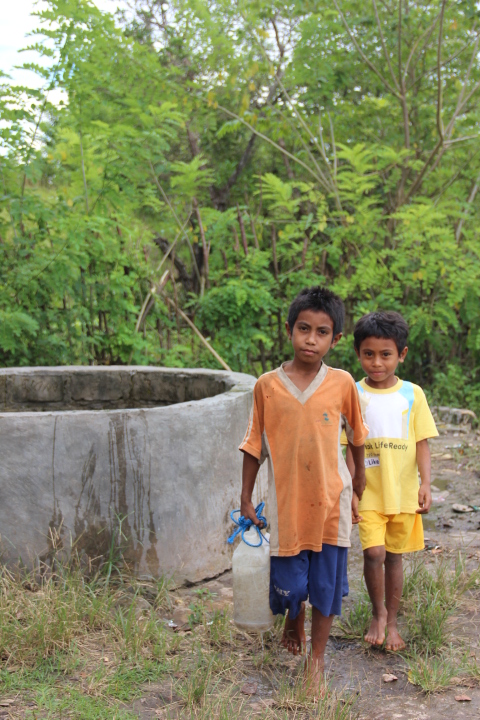
FMNR brings back the well of life
October 20, 2016
By Beatrix Mbete, World Vision Indonesia
Farmer Managed Natural Regeneration (FMNR) program which was applied in East Sumba’s dry land has changed the life of Ripu villagers especially children. Ripu is well known as driest place in Sumba Island that the villagers need to walk miles away to fetch water. Even Yovintus, 8, and Elton, 7, have to go to their school without having shower since there is no water in their home. But now, everything has changed because FMNR program enables trees to grow up even in dry land.
In East Sumba Yovintus, eight, and Elton, seven, run over the road towards the well located 200 meters away from their home. Both of them live in Ripu, a sub-village in East Sumba, Indonesia; which was previously known as the driest village in the area. Arriving at the well, the boys use jerry cans to fetch water and transfer it into another jerry can that Yovintus brings from home. After that, they go home carrying the water that will be used by their family. Previously it was very difficult for them to access water. One reason why Ripu village is known as the driest place, is that it does not have any natural springs to use. The one and only spring is located in Tewangga, an area which is located 1.5 km away from the village. People can get there by walking by foot only. When the dry season comes, people from Ripu use the available water, which is very dirty. And when there is no water, Yovintus and Elton have to come to school without taking a bath.
While this was a sad experience in the past, now things are different. Today, the boys can now bathe before going to their school. “We can now take a bath every day because water is now abundantly available in our village,” said Yovintus speaking about his new experience now that water is available in their village’s well. Farmer Managed Natural Regeneration (FMNR) is a program initiated by World Vision that has successfully changed the villagers’ lives. Offering planting and reforestation, the FMNR program has trained Ripu villagers to make their own demonstration plot and plant it with plants such as mahogany and gmelina trees. By treating those plants regularly, currently the seeds have turned into tall trees. When the dry season comes, there is still water because the trees have held the water in the ground. Every afternoon, Ripu villagers bring their children to take a bath near the well. They can also wash their clothes and give water to their cattle there. “Before FMNR existed, the water was only available until August. After that time, people need to fetch water in Tewangga, 1.5 km away from this village. When the area really dries, we need to spend extra money from about Rp. 150.000 or Rp. 300.000 to buy water provided by the government,” said Lusia, 26, a mother from Ripu village explaining the differences between the lives of villagers past and present. Today, there is sufficient water to meet the needs of the Ripu villagers. They no longer have difficulties accessing clean water. The FMNR process in East Sumba really brings many benefits for Ripu villagers especially children like Yovintus and Elton.
